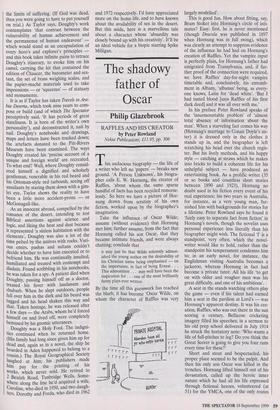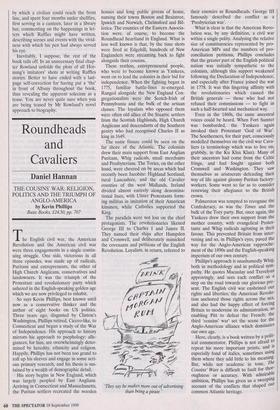The shadowy father of Oscar
Philip Glazebrook
RAFFLES AND HIS CREATOR by Peter Rowland Nekta Publications, £11.95, pp. 306 This audacious biography — the life of a writer who left no 'papers' — breaks new ground. 'A Person Unknown', his biogra- pher calls E. W. Hornung, the creator of Raffles, 'about whom the same sparse handful of facts has been recycled remorse- lessly.' So here we have a picture of Hor- nung drawn from scrutiny of his own fiction, worked upon by the biographer's imagination.
Take the influence of Oscar Wilde; assume (without evidence) that Hornung met him; further assume, from the fact that Hornung called his son Oscar, that they became intimate friends, and were always chatting; conclude that it may just be that Wilde solemnly admon- ished the young author on the desirability of his Christian name being emphasised — on the importance, in fact of being Ernest . . . This admonition . . , may well have been the inspiration for . . . one of the most brilliantly funny plays ever written.
By the time all this guesswork has reached the blurb, it has become 'Oscar Wilde, on whom the character of Raffles was very largely modelled'.
This is good fun. How about fitting, say, Bram Stoker into Hornung's circle of inti- mates? Easy: first, he is never mentioned (though Dracula was published in 1897 when Hornung was in full swing), which was clearly an attempt to suppress evidence of the influence he had had on Hornung's creation of Raffles. Yet the vampire input is perfectly plain, for Hornung's father had emigrated from Transylvania, and, if fur- ther proof of the connection were required, we have Raffles' day-for-night vampire timetable and, conclusively, his entomb- ment in Albany, `albanus' being, as every- one knows, Latin for 'dead white'. 'But I had tasted blood [says Raffles of his first dark deed] and it was all over with me.'
In his preface Peter Rowland speaks of the 'insurmountable problem' of 'almost total absence of information about the man'. When a starveling fact comes his way (Hornung's marriage to Conan Doyle's sis- ter) it is dressed only in the clothes it stands up in, and the biographer is left scratching his head over the church regis- ter. But his lively methods, and his happy style — catching at straws which he makes into bricks to build a coherent life for his unhelpful subject — have produced an entertaining book. As a prolific writer (35 or so books and countless short stories between 1890 and 1923), Hornung no doubt used in his fiction every event of his real experience; his two years in Australia, for instance, as a very young man, fur- nished him with backgrounds for stories for a lifetime. Peter Rowland says he found it `fairly easy to separate fact from fiction' in Hornung's novels, though the novelist uses personal experience less literally than his biographer might wish. The fictional 'I' is a standpoint, very often, which the novel- writer would like to hold, rather than the standpoint his temperament condemns him to; in an early novel, for instance, the Englishman visiting Australia becomes a jackeroo, whereas Hornung in fact had become a private tutor. All his life 'to get on with older and rougher men was his great difficulty, and one of his ambitions'.
A seat in the stands watching others play the game — even if his talent had earned him a seat in the pavilion at Lord's — was Hornung's apparent destiny. It was his cre- ation, Raffles, who was out there in the sun scoring a century. Bellicose cricketing imagery filled his speeches; in a sermon to his old prep school delivered in July 1914 he struck the hortatory note: 'Who wants a life of full-pitches to leg? Do you think the Great Scorer is going to give you four runs every time for these?'
Short and stout and bespectacled, his proper place seemed to be the pulpit. And then his only son Oscar was killed in the trenches. Hornung lifted himself out of his devastation, called up the heroic inner nature which he had all his life expressed through fictional heroes, volunteered (at 51) for the YMCA, one of the only routes by which a civilian could reach the front line, and spent four months under shellfire, first serving in a canteen, later in a library hut, commenting on the happenings in let- ters which Raffles might have written, describing scenes and events with the vivid- ness with which his pen had always served his eye.
Inevitably, I suppose, the rest of the book tails off. In an unnecessary final chap- ter Rowland unfolds the plots of all Hor- nung's imitators' shots at writing Raffles stories. Better to have ended with a last- page self-correction for having put a 'the' in front of Albany throughout the book, thus revealing the apparent solecism as a tease. You are never quite sure when you are being teased by Mr Rowland's novel approach to biography.



























































































 Previous page
Previous page